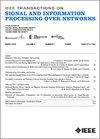联合统计掩码学习和无支持先验分布估计
IF 3
3区 计算机科学
Q2 ENGINEERING, ELECTRICAL & ELECTRONIC
IEEE Transactions on Signal and Information Processing over Networks
Pub Date : 2025-08-15
DOI:10.1109/TSIPN.2025.3599781
引用次数: 0
摘要
本文解决了部分可观测条件下的分布式估计问题,其中节点必须协同处理被掩盖或不完整的测量以推断全局目标向量。这种屏蔽源于传感限制、通信约束或隐私要求。我们提出了一种新的分布式掩模信息学习框架,扩展了扩散最小均方(DLMS)算法,使其在特定节点的观测掩模下运行。为了实现有效的合作,我们开发了一种信号流启发的组合策略和基于阈值的支持推理算法。这允许每个节点识别目标信号的可观察分量,并自适应地控制局部估计的扩散。从均值和能量两方面分析了该方法的收敛性,并推导了基于掩模估计误差的最优阈值选择条件。在时间域和变换域稀疏场景下的仿真结果表明,我们的方法比标准DLMS的均方差提高了30-40 dB,与现实可观测比下完全可观测设置的性能相匹配。这些结果强调了掩码感知适应在网络上鲁棒和可扩展信号处理的潜力。本文章由计算机程序翻译,如有差异,请以英文原文为准。
Joint Statistical Mask Learning and Distributed Estimation Without Support Priors
This paper addresses the problem of distributed estimation under partial observability, where nodes mustcollaboratively process masked or incomplete measurements to infer a global target vector. Such masking arises from sensing limitations, communication constraints, or privacy requirements. We propose a novel framework for distributed masked information learning, extending the Diffusion Least Mean Squares (DLMS) algorithm to operate under node-specific observation masks. To enable effective cooperation, we develop a signal-flow-inspired combination strategy and a thresholding-based algorithm for support inference. This allows each node to identify observable components of the target signal and adaptively control the diffusion of local estimates. We analyze the convergence of the proposed method in terms of mean and energy, and derive conditions for optimal threshold selection based on mask estimation error. Simulation results across both time- and transform-domain sparsity scenarios show that our method achieves a 30-40 dB improvement in mean square deviation over standard DLMS, matching the performance of fully observable settings under realistic observability ratios. These results underscore the potential of mask-aware adaptation for robust and scalable signal processing over networks.
求助全文
通过发布文献求助,成功后即可免费获取论文全文。
去求助
来源期刊

IEEE Transactions on Signal and Information Processing over Networks
Computer Science-Computer Networks and Communications
CiteScore
5.80
自引率
12.50%
发文量
56
期刊介绍:
The IEEE Transactions on Signal and Information Processing over Networks publishes high-quality papers that extend the classical notions of processing of signals defined over vector spaces (e.g. time and space) to processing of signals and information (data) defined over networks, potentially dynamically varying. In signal processing over networks, the topology of the network may define structural relationships in the data, or may constrain processing of the data. Topics include distributed algorithms for filtering, detection, estimation, adaptation and learning, model selection, data fusion, and diffusion or evolution of information over such networks, and applications of distributed signal processing.
 求助内容:
求助内容: 应助结果提醒方式:
应助结果提醒方式:


